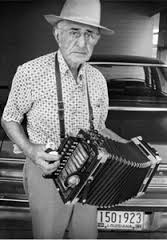Annotation:Patassa Two-Step: Difference between revisions
No edit summary |
No edit summary |
||
| Line 2: | Line 2: | ||
---- | ---- | ||
<p><font face="garamond, serif" size="4"> | <p><font face="garamond, serif" size="4"> | ||
'''PATASSA TWO-STEP.''' Cajun, Two-Step (4/4 time). USA, Louisiana. D Major. Standard tuning (fiddle). AABB. The song was named by Ambrose Thibodeaux for a place just south of Eunice, Louisiana. According to Raymond Francois (1990), the name ''patassa'' derives from a Choctaw Indian word meaning sunfish or perch. | '''PATASSA TWO-STEP.''' Cajun, Two-Step (4/4 time). USA, Louisiana. D Major. Standard tuning (fiddle). AABB. The song was named by Ambrose Thibodeaux for a place just south of Eunice, Louisiana, near where he was born and raised. According to Raymond Francois (1990), the name ''patassa'' derives from a Choctaw Indian word meaning sunfish or perch. | ||
<br> | <br> | ||
<br> | <br> | ||
Revision as of 17:59, 30 August 2015
Back to Patassa Two-Step
PATASSA TWO-STEP. Cajun, Two-Step (4/4 time). USA, Louisiana. D Major. Standard tuning (fiddle). AABB. The song was named by Ambrose Thibodeaux for a place just south of Eunice, Louisiana, near where he was born and raised. According to Raymond Francois (1990), the name patassa derives from a Choctaw Indian word meaning sunfish or perch.

Source for notated version: Ambrose Thibodeaux (La.) [Francois].
Printed sources: Francois (Yé Yaille, Chère!), 1990; p. 244.
Recorded sources: La Louisiane Records LL-112, Ambrose Thibodeaux. Valcour Records VAL-CD-0016, "Wayne Toups, Steve Riley, Wilson Savoy – The Band Courtbouillon" (2011).
See also listing at:
Hear the tune played by The Band Courtbouillon on youtube.com [1]
